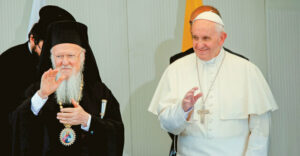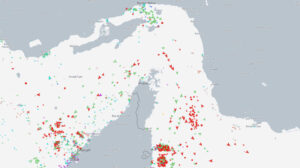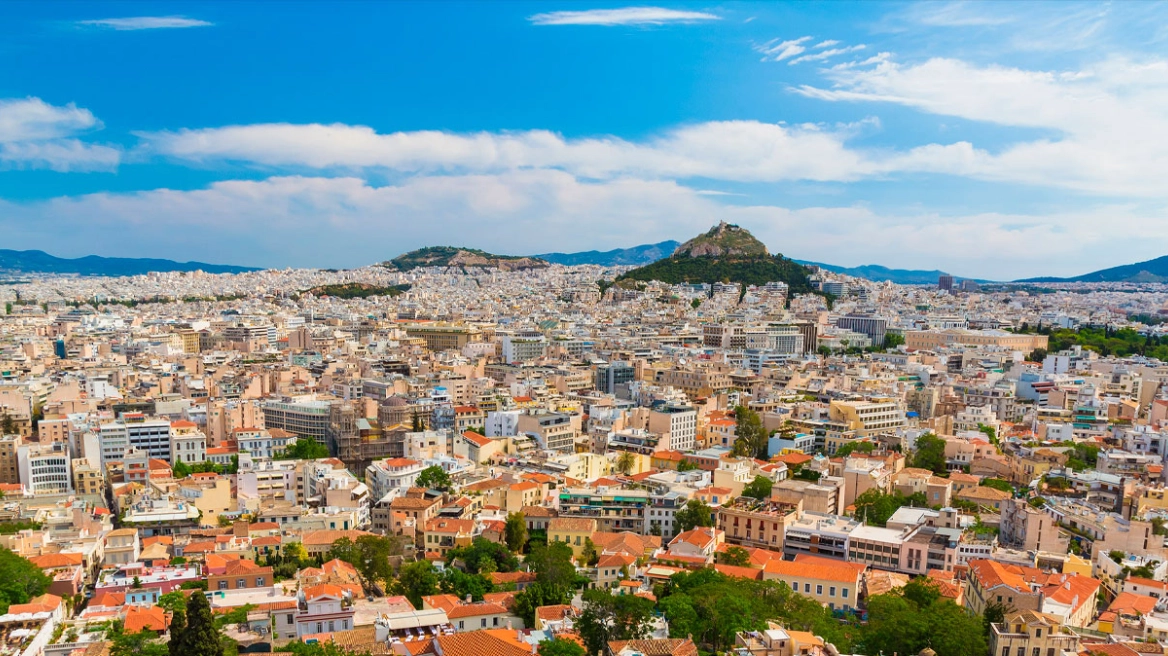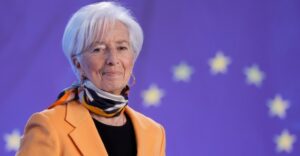According to Ecumenical Patriarch Bartholomew, the separate celebration of Easter by Orthodox and Catholics constitutes a “scandal”. Completely in tune and in the same tone, Pope Francis proclaims that “Easter belongs to Christ, not to the calendars of us mortals.”
When such consensus is found between the heads of the two secular branches of Christianity, the Orthodox and the Roman Catholic Church, the least one can observe is that the road to the establishment of a common Easter celebration has been opened. And that is with the prospect that the unified celebration of Easter will be in place in perpetuity, not just for 2025, when there will anyway be a calendar coincidence of Orthodox Easter with Catholic Easter (and Westerners in general, including Protestants, etc.).
The reactions
At present, the possibility of abolishing the double celebration throughout Christendom takes the form of a wish, a wishful thinking, as expressed on both sides and repeatedly by the Ecumenical Patriarch and the Pope. Nevertheless, negative reactions have already manifested themselves with varying intensity and from different sides: circles of Russian Patriarchate and those who align themselves with the positions it adopts, either from the ranks of the Clergy or from politicians and supporters of factions on the spectrum of the conservative or even the extreme right, oppose in principle any attempt to converge the “pure Orthodoxy” with the schismatics, as Catholics are collectively described.
Inevitably, then, the expressed intention shared by His Holiness Patriarch Bartholomew with the Pope Francis for the permanent common celebration of Easter and the fellowship of millions of believers in Christ emerges as an issue that does not only concern liturgical or doctrinal matters.
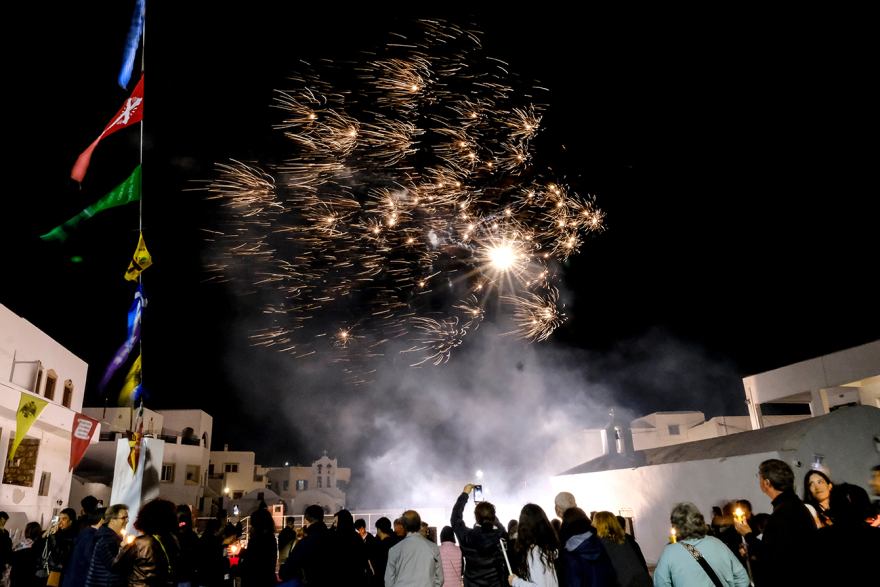
The common Easter is even linked to the ongoing geopolitical turmoil, particularly as it relates to the Russia-Ukraine war. But also in light of the formation of a united Christian front against the dangerous radicalization of Muslims, the long-standing unwillingness of the two Churches to come together, even on the date they commemorate the Passion Week, the Crucifixion and Resurrection of the Lord, sends out anything but a message of unity. And this takes on special significance at a time of an off-the-charts explosion of religious fanaticism in the Middle East, with the exchange of deadly blows between Israel and Shiite Muslim organizations such as Hamas and Hezbollah, backed by the theocratic ayatollah regime in Iran.
The expression of the wish to establish a joint Orthodox-Catholic Easter celebration is coupled with a world-historical anniversary for Christianity: the 1,700th anniversary of the The First Ecumenical Council, an event that, barring any unforeseen event, will be marked by a solemn meeting between Patriarch Bartholomew and Pope Francis in Nice, Bithynia, the very place where the Council met in 325 AD. In what is now Iznik, in the north-western Turkish province of Prussa, the heads of the two Churches are expected to seal their plans for future coexistence, thus honouring in practice the decisive importance of what was decided at the First Ecumenical Council. It was convened by Constantine the Great, the first Roman emperor to convert to Christianity.
His goal was to protect Christianity from the heresy of Arianism, to draw up the Creed and, among other things, to set a rule for calculating when Easter would be celebrated. “In the spirit of this, the wish is unanimously expressed,” notes a recent communiqué of the Holy Synod of the Hierarchy of the Ecumenical Throne of Constantinople, “that the common celebration of Easter next year by Eastern and Western Christendom should not be a mere happy coincidence, but the beginning of the establishment of a common date for its celebration each year, in accordance with the Passover of the Orthodox Church.”
Summit Agreement
In his remarks, Patriarch Bartholomew stresses that “we are optimistic, as there is good will and willingness on both sides. For, indeed, it is a scandal to celebrate separately the unique event of the one Resurrection of the One Lord!” While the Pope, in proclaiming his support for the idea of a common celebration, in some of his regular references to the matter has exclaimed “what a wonderful thing it would be if the anniversary of the First Ecumenical Council were to become the concrete beginning of a permanent common celebration of Easter.”
Pope Francis, in an interview with the Italian newspaper Avvenire last May, had developed the view that “on May 5, 2024, the Orthodox Churches will celebrate Easter more than a month later than the Westerners. Obviously it is a matter of calendar calculations, even if the dream of a common celebration is still alive in the background. The war in Ukraine has made dialogue even more difficult in practice, but those of us who stand for unity are not deterred, even though the more hardliners are regrouping and preparing for a new round of confrontation.”
With statements of this kind the Pope is clearly “choosing sides”, since his alliance with Patriarch Bartholomew automatically implies his opposition to Patriarch Kirill of Moscow and Pope of Russia. He has clashed head-on with Bartholomew over Ukraine in a ruthless rivalry that culminated in October 2018 when Bartholomew proceeded to grant autocephalous status to the Orthodox Church of Ukraine.
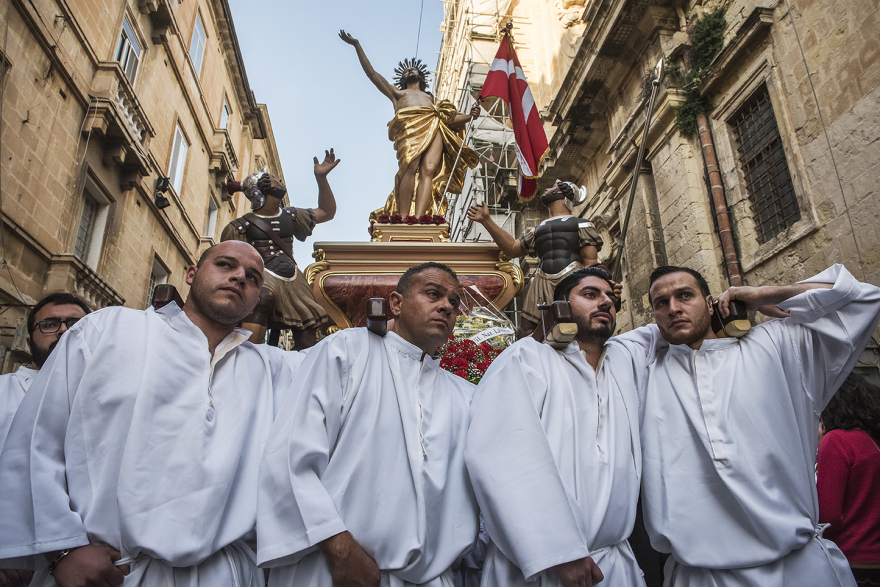
Cyril took this action as an unforgivable insult and, ultimately, a “sacred” casus belli. Subsequently, he completely severed communion with the Ecumenical Patriarchate, causing the so-called “Orthodox schism”. Hence, plans for a joint celebration of Easter with the Roman Catholics are seen as yet another provocation on the part of Bartholomew, yet another blow to his already irreparably broken relations with Cyril.
Apart from these intra-church issues, as far as the Greek state’s position on the issue is concerned, the visit of Kyriakos Pierrakakis to the Vatican on 8 May 2024, the first ever for a Greek Minister of Education and Religious Affairs to visit the papal seat, was eloquent in itself. Accompanied by the Catholic Archbishop of Athens Theodore Kontidis and the Secretary General of Religious Affairs Georgios Kalantzis, Pierrakakis, during his discussion with the Pontiff, confirmed that the Greek government strongly supports the idea of abolishing the dual celebration of Easter for Orthodox and Catholics.
The story of a schism
The origins of the calendar differentiation between Orthodoxy and Roman Catholicism in terms of the celebration of Easter, like the entire history of Christianity, must be traced to its Jewish roots. The Jews divided the year according to the phases of the moon, so their own Passover, namely the crossing of the Red Sea (the “Pesach”, from which the word “Passover” was derived, as a corruption), thanks to which, miraculously, the people of Israel were saved from the Egyptian army, was celebrated on the 14th day of the month of Nisan. That was the day of the first spring full moon, immediately after the vernal equinox. Subsequently, moving on to the events described in the New Testament, and given that Jesus Christ rose on the day after the Jewish Passover, this date was also adopted by Christians.
Nevertheless, the rule of calculating the longest movable feast in the Christian calendar was not observed by all local communities of believers. As a result, the situation had begun to develop into chaos, something that greatly troubled Constantine the Great, who decided to put the cultic milestones of Christianity in order once and for all. And this is exactly what was attempted with the convening of the First Ecumenical Council, as mentioned above, in 325 AD. Then, at a time when the Julian Caesar version of the calendar, or “Julian”, was in force, it was decided that Easter would be celebrated on the first Sunday after the first full moon of spring. And if the moon happened to fill up on a Sunday, Easter would be postponed by one week.
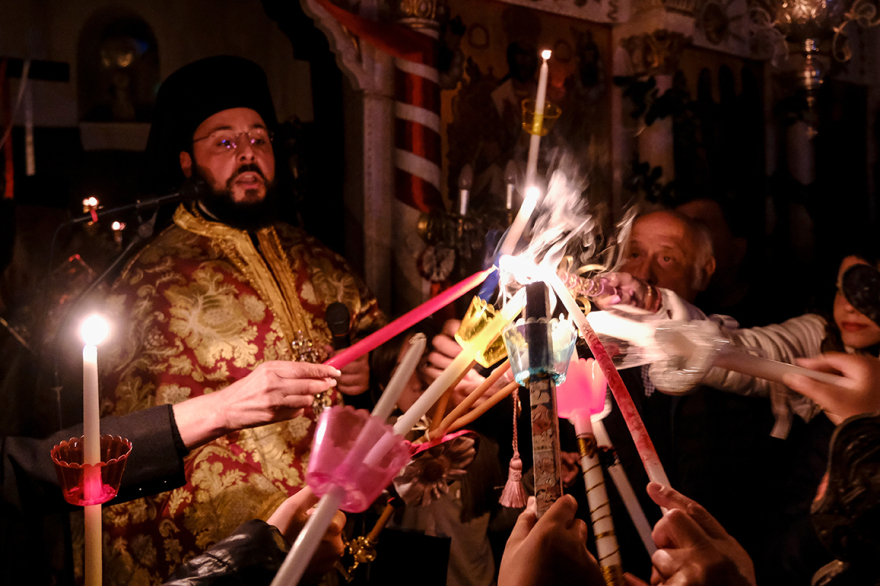
In this way the Christian was separated from the Jewish and now the responsibility for the exact determination of the feast was taken over by the Alexandrian astronomers. Unfortunately, however, despite their amazing abilities, even the brilliant scientists of the time could not avoid errors, and as a result there was a very large discrepancy, on the order of whole weeks, in the calculation of the vernal equinox as the centuries passed. Meanwhile, as early as 1054, the Christian Church had already been split, and by the Middle Ages, in 1582, when then Pope Gregory XIII decided to correct the errors of the Alexandrians once again with a new calendar reform, Easter once again became the central reference point.
With the “Gregorian” calendar, 5/10/1582 was rechristened 15/10/1582. As it went without saying, all the countries in the West where Roman Catholicism was the dominant religion immediately adapted. Something that the Orthodox communities, such as the Greek – even under the Turkish yoke – vehemently refused to do, also as was self-evident. The ice between the two Churches was broken when Ecumenical Patriarch Athenagoras I and Pope Paul VI of Rome met, for the first time since the Great Schism of 1054, at 9.30 in the evening of 5/1/1964, on the Mount of Olives in Jerusalem. The historic meeting of the two church leaders laid the foundation stone for the Annulment of the Anathemas that divided the Church, and paved the way for dialogue between the Orthodox and Roman Catholic Churches.
The vernal equinox
Even when the Gregorian calendar was officially adopted in February 1923, the determination of Easter was excluded, remaining tied to the Julian calendar, plus some the errors of ancient astronomers. However, what is generally true is that the vernal equinox of March 21 in the Julian calendar corresponds to April 3 in the Gregorian calendar. This implies that if the full moon occurs before April 3, the Orthodox are forced to wait for the next full moon. But then the interval between the two Passovers amounts to a whole month, as happened in 2021.
Orthodox Easter is sometimes celebrated on the Sunday after the second instead of the first spring full moon, which adds to the complexity of the whole affair, and makes the possibility of coincidence with Catholic Easter seem like a remarkable, paradoxical and completely random event. In this sense, a joint decision by the Ecumenical Patriarch and the Pope to henceforth celebrate Easter in a unified and stable manner, beyond doctrinal disagreements and historical discord, would be tantamount to a definitive solution to a futile Gordian knot.
Photo: EUROKINISSI
Ask me anything
Explore related questions
